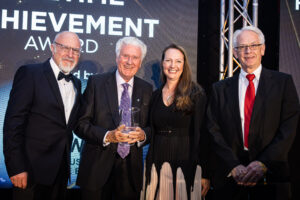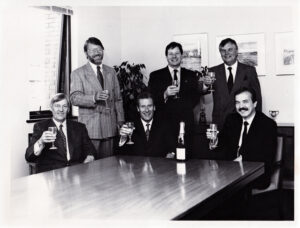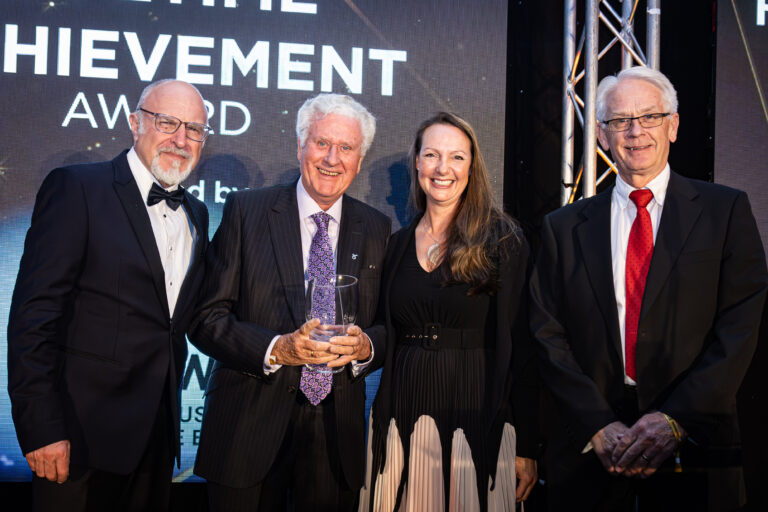The man affectionately dubbed the Godfather of the modern egg industry built his career on an eye for M&As. Michael Barker hears Peter Dean’s story
Some people would shirk under the stress of everything that goes with acquiring and integrating a business, but for a certain type of individual, the process is nectar itself.
Such a character is Peter Dean, the driving force behind making Noble Foods the egg market leader that we know today, whose career thrived on expanding and growing his business from the humblest of beginnings. In recognition of his decades of work, the now retired 80-year-old was handed the Lifetime Achievement gong at the 2024 National Egg & Poultry Awards.

Dean’s story began in 1940s Berkhamsted, Hertfordshire, where he was born the son of an egg merchant. His father and uncle ran a business called Dean Brothers, and given their profession it is unsurprising that a teenage Peter began working with them. So far so traditional, but from the earliest days it was clear that he wasn’t cut from the usual cloth, and just a couple of years into his career he made what turned out to become a Dean hallmark – his first acquisition. “I was about 20 and I bought a company called Sun Farm Eggs, which was based in London,” he recalls. “My father thought I was mad because I borrowed money and that was something he’d never done in his life. But I went to the bank and borrowed five thousand quid.”
Dean is remarkably sanguine about having made such a bold and entrepreneurial move at an age when most young men don’t have a clue what to do with their lives, simply describing it as “an opportunity” to take on a business that had fallen into administration. He was, it was fair to say, also highly ambitious, admitting that his drive emanated from having come from simple beginnings and a desire to achieve something for himself.
He looked up to his father, but that was as much for his human qualities as anything. “I don’t think he was a very ambitious man, but he had a lot of friends and he was very good at selling himself,” Dean says. “I think that’s what you’ve got to do when you’re selling product – sell yourself first. Dad picked up a lot of business just by his personality and character. I think I learned a lot from that. He was a great sportsman as well and very much a team player, so wherever we went, everybody thought the world of him. And yes, he was a bit of a role model to me.”
The Dalgety years
Dean threw himself into the job, and over the years progressed to become managing director, but when commodity food giant Dalgety came with an ultimatum to purchase Dean’s family business or it would pack its own eggs, his father felt he had no option but to accept the takeover.
Describing himself as having had little in the way of formal education, Dean says he very much received one thanks to “some very patient governors” at Dalgety, with whom he worked for 20 years. There, he further developed his knowledge of acquisitions, reckoning they bought out at least a dozen smaller companies over that period. That helped turbocharge production from 5,000 cases a week up to around 70,000. “The industry was full of small egg packers, so there was opportunity there,” he says. “It was fun. That was the beginning of enjoying the thrill of an acquisition and picking up new retail customers. I thought that was great.”

It’s accurate to call Dean an innovator and he always wanted to give the customer what they wanted. He pioneered moving from a 30-dozen box to putting the eggs into a sleeve that could be lifted out, before trialling plastic containers, trolleys and more. “I was always trying to think how can we save the retailers cost in store and get it onto shelf in a much more efficient way,” he says. “Then we did marketing like cooking in stores, demonstrations and so on to grow the business.”
Acquisitions became a constant theme of Dean’s career, but what made him so keen on them? “It’s a win-win, really, because you grow your own business and you knock out a competitor,” he explains. “Before I ever made a bid, I knew exactly what I was going to do with it, where I could cut costs, where I could integrate, and what I could close. Everything was quite well planned, and I used to have in my mind what I’d do.”
Dean has no regrets about selling his family business to Dalgety, and stresses that he enjoyed some great times there, learning, meeting good people and taking part on other industry boards. He describes it as a “broad educational programme” that set him up very well for when the opportunity arose to take Deans Foods back under his own control.
That day, which Dean regards as the highlight of his career, arrived in 1991. It was clear that while Deans remained a commodity business, Dalgety was moving more into brands, and the management gave Dean a year to stump up the cash to buy it back. He did so in just six months, and never content to rest on his laurels, he followed that up with a statement of intent to retailers by putting in three new 120,000 bird houses with the latest equipment and even research facilities in Nottinghamshire.
That high was followed by the worst moment of Dean’s life – the sudden and tragic loss of his son Anthony, who died of an asthma attack in 1992 at the age of just 19. “So we went from the euphoria of getting the business back to devastation,” Dean recalls. “And you’ve lost something that no amount of money can ever buy. It was very difficult because we were a close family.”
Industry change
In his professional life, Dean also lived through some momentous changes in the egg industry as every aspect of the business evolved, but one of the standout incidents was health minister Edwina Currie’s infamous comments in 1988 that most of Britain’s egg production was infected with salmonella bacteria. “It was hell, because your sales just dropped off a cliff and nobody bought eggs,” he remembers.
And yet, rather than anger and frustration at what was a watershed moment in the industry’s history, Dean prefers to find the silver lining, which was that the sector was forced to pull its socks up. On the British Egg Industry Council with legendary figures such as Aled Griffiths and Andrew Parker at the time, Dean praises the work of his compatriots and the likes of Andrew Joret, who helped put the industry into a better place. “We all thought it was a load of rubbish at first, but once we started doing more testing we saw that clearly there was some basis to Edwina’s utterances,” he concedes. “And so we all had to clean up our act, which we did over a two-to-three year period, and the Lion was born again. It made some farms that were not as good as they could be sharpen up. It took a long time, but we did get Edwina to say that all eggs are safe.”
Accelerating growth
With his company back in his own hands, Dean continued to hit the acquisition trail. He picked up Dell at Chesterfield and HD Hardie in Edinburgh, before the cherry on top – the purchase of Daylay from Hillsdown in 2000, a move that would double the size of his business. He probably gave his bank manager sleepless nights – “I went back to the bank and I said I know you’ve agreed for me to buy one business, but can I buy two instead please?”, he chuckles of the Dell and Hardie purchases – but eventually he pushed his luck too far. The bank said the deal for Daylay was too risky, so he turned instead to auditors Deloitte, who found him funding from the US. “We paid the money back and it did everything I thought it would, but it made us go from 70,000 cases to 140,000, so it was a big acquisition,” he remembers. “It also got us another three feed mills and into hen processing.”
The next big purchase was Freshlay, but it was when Deans merged with Stonegate to create Noble Foods in 2006 that the market-leading business that we know today was born under the co-ownership of Dean and Michael Kent. However, the deal fell foul of the Competition Commission, which stepped in and ordered that Stonegate be sold off, leaving that business as an independent company that still operates today.
Dean – who describes the commission’s decision as a disappointment – stepped back from day-to-day operations when Kent joined and he ultimately went on to retire as his daughter Sarah came into the business, ready to make her mark. His final deal was to buy out Kent to bring the business fully back into family ownership.
Nobody could begrudge anyone putting their feet up after such a storied career, but Dean is honest enough to admit that he misses the day-to-day buzz: “I play a bit of tennis, watch a bit of football and do a lot of shooting, all that sort of stuff,” he says, “but there’s nothing that can ever replace the fun of running a business. In all the years I did it I never found it that stressful, because I had a brilliant team around me. I also employed people cleverer than me and that helps, so they only came to me with the big decisions and I could leave things to them. And there was so much fun, it really was fun.”
These days, Noble Foods is chaired by Sarah, and Dean expresses pride in the way his daughter has forged her own path with the business. “I’m glad to see that she’s running it the way she wants to, and has a very good team around her,” he says. “She’s very keen on developing her people and giving them training and a sense of belonging within the company. And of course [chief executive] Duncan Everett thinks along the same lines as her, so I think they’re a good team. They also continue the value which our producer suppliers are to our business. They have always been our lifeblood, and I am glad that they carry on this tradition of appreciating the closeness of many longstanding family friends.”
Dean says it’s “bloody difficult” running a business now with the huge range of rules and regulations, and insists that he “wouldn’t be any good at it in this day and age”, though one suspects that isn’t true. He lists his biggest career influence as Peter Kemp, the former chairman of the National Egg Marketing Association, whom he describes as “a great politician who was good at taking the industry with him”. “He took me under his wing and I was a bit like his son I think. When we bought Goldenlay he was managing director, so that shows you how close I was to him. And I’m not a great speaker, but I was privileged to do the eulogy at Peter’s funeral. I shy away from that sort of thing but I really wanted to do it. He was such an influence and I respected him so much. He was a really good man.”
Aled Griffiths – who Dean calls “a very educated and astute politician” – is another that he namechecks, having worked closely together on the British Egg Industry Council. Such titans of the industry stand well alongside Dean, who was mischievously dubbed by a former Tesco boss as “the godfather of the egg industry” when Dean gave the supermarket the thumbs up to run a conference at a hotel near his site. The nickname stuck ever since.
Given his influence over the years, it feels appropriate. He might have done his last big deal, but with a career unlike any other, his legacy will continue for many years to come.


